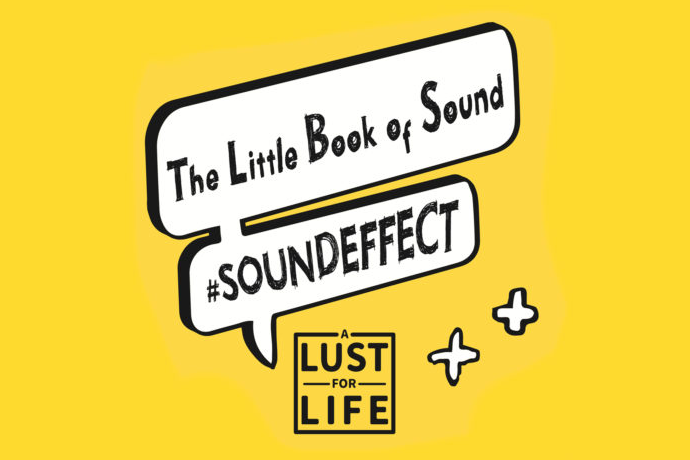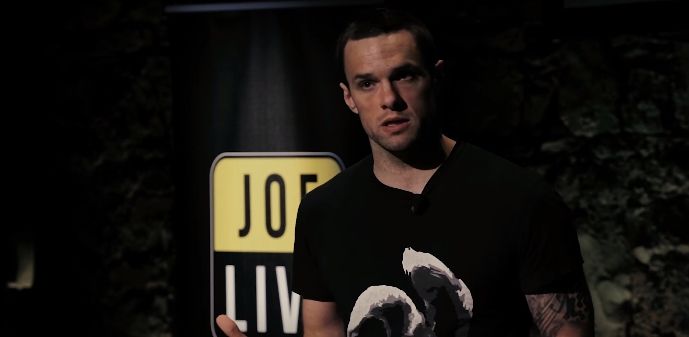

Share
26th August 2017
09:32am BST

Being alone or atomised is often how we choose to live today. We remove ourselves from the world around us and escape into a different universe, a universe which promises escape and a connection of sorts, even if the connection isn’t real and often isn’t meaningful.
We can disappear down wormholes, obsessively refreshing news feeds (because the news today seems worthy of obsessively refreshing) while watching an online pile-on as somebody is called out for some moment of transgression, before somebody may be counter-called out for a counter-transgression in response. These exchanges take place with all nuance, subtlety and compassion removed and even if we are only observing, it can be wearing.
But it passes the time, even if it is reshaping our brains and doing something to our minds as the time passes. The time would have passed anyway, but maybe it could pass in a different way.
On Thursday, Pieta House and A Lust for Life combined to launch #SoundEffect, a step in a different direction, a campaign where people share those moments when someone was sound to them or they did something kind and help create a "wave of soundness".
You've probably heard about it by now. You might have heard Bressie, Brian Higgins or Paula McLoughlin talking about how ‘little moments of soundness’’ can make a difference in our lives. You might know about their plans for Electric Picnic and the Wall of Sound. You might have heard about the “Little Book of Sound” and what you might learn about the science of soundness if you read it.
Some of you might have laughed or rolled your eyes and wondered how these little gestures can combat a world of negativity. Some of you might have laughed and rolled your eyes and wondered who these guys think they are that they can save the world by encouraging people to be kind.
The people at Pieta House and A Lust for Life anticipated that point of view, but when they launched the campaign on Thursday, the message that came back was something different. People knew they weren’t suggesting a cure for the world’s problems or a simple fix for the deep and complex area of mental health, but they sensed that the idea of “being sound”, of doing something kind, made sense. Not in an abstract sense but in a fundamental way because everyone has experienced those moments and knows that, while soundness might not solve your problems, one act of kindness can alter the perspective on a day, and sometimes there is nothing more important than that.

“We don’t have to teach people what it is,” Brian Higgins CEO of Pieta House says of the campaign and the immediate reaction.
“The thing that got me,” says Paula McLoughlin of A Lust For Life, “is that if you surround yourself with people who are decent and who are sound, your stress levels go down. If you do something decent for somebody else, you produce serotonin and there’s a physical impact on your body. And you’re actually generating an antidepressant for yourself. That was what got me, there’s science, so if we could actually move this an inch down the road, there would be slightly fewer people knocking on Brian’s door.”
The simplicity of it and the timing is what makes it resonate. On Thursday afternoon, the three of them were sitting in Bressie’s studio on Thursday after a day of press events when their message was grasped and understood.
‘It’s switching on a light switch and it’s the beginning of a long road,” McLoughlin says. “All we’re trying to do is chip away at things. Not one group is going to create that big bang. It’s chipping away and making people go, ‘Fuck, that’s not a bad idea’,” says Bressie.

It’s important to stress that it helps and it’s also important to stress that it doesn’t fix everything. Bressie has been here before and he knows that sometimes it can be reported in a way which suggests there is a simple answer.
“I’ve seen headlines with me that said things like, ‘Run a marathon and cure your depression’,” he says. “When the fuck have I ever said that? How dare you play with that?”
This campaign is aimed at everyone, at encouraging people to make more of a connection in their lives at a time when it’s easier to withdraw. It's about recognising that everyone can improve their mental health, it's about, as Bressie says, treating your mind the way you might treat your heart.
“People are saying, ‘How does this make a difference?’,” Higgins says. “How does this sound thing make a difference and I think it’s context. I could be doing my functioning day with my standard levels of stress and sometimes it’s that little act of soundness that makes me realise that the context I’m operating within today is a fabricated context. The wider context is a much more beautiful thing.”
The hashtag #SoundEffect provided some immediate examples of how the public had grasped it and felt it was necessary. “It’s very important with this campaign that we highlighted the science of what negativity can do,” Bressie says. “Unrelenting negativity where we’re being fed it from all sides is too much, it’s overwhelming.”
On Thursday, they began to see how much it resonated with people. With a series of talks taking place at Electric Picnic, the conversation will be teased out further. They don’t know where the conversations are going to go, they can’t control that, but they all agree they have to go somewhere, that things have to change.
“I’m a bit addicted to my smartphone but I’m gradually giving myself time away from it,” McLoughlin says. “Technology is brilliant, but we have to learn how to manage it better,” Bressie says.
The world has always felt terrifying viewed from a certain angle and people have complained about bad news trumping good long before Trump, but it seems more accessible now and more relentless.
“A therapist said to me years ago that you need to stop worrying about things you have no control over,” Bressie says.
“I have no control over the guy who goes on Twitter and wants to rip somebody apart because of something he didn’t agree with. What I do control is how sound I can be to some other random fecker. I can’t control what comes out of Donald Trump’s mouth, I cannot control the racism that’s been celebrated in some areas of America. If I try to control that I’ll be overwhelmed by it. But what I can do is find something I can do with an individual on any given day. People out there might say, ‘That’s not going to make a difference’. But yes it is, it really is. That’s how movements start.”
But the finest responses to any cynicism was the insistence that this wasn’t some pious campaign, something aimed at making you look good.
“They don’t have to go next door and build a garden shed,” McLoughlin says. “It can be as simple as don’t call that guy fucker, let that guy out in front of you. That came up a lot today, people thought it was about random acts of kindness in the 'Look what I’m doing, Comic Relief' way. But it’s not… This isn’t about preaching to people or saying everyone is in crisis. It’s about saying, 'lads, there’s a better way to take care of your mind'.”
The campaign is about incorporating soundness into everyone's day. “Real life is not Oprah Winfrey quotes, we’re not trying to do pious bullshit,” Bressie says. “Part of being human is suffering, it’s part of life. But so is good shit.”

They all know that there is so much that has to change about how Ireland deals with mental health, but this is a campaign that stresses how everyone can make a difference.
“A lot of things we do in life are learned behaviour that we can unlearn,” Higgins says, “and this is the same thing. We can try and move forward on a level of positivity that we know works.”
There is only so long people can keep putting their minds through this unrelenting pressure, Bressie says, and they’re hoping that the campaign helps shape a preventative approach to mental health which is the only way of coping in the long-term.
“We’re all in this category,” he says. “People might say ‘What is this campaign going to do for the guy who is seriously unwell?’, but we can’t think like that. We’re trying to create a kinder society which will benefit everyone. We’re trying to change that and it will take fucking years.
“When we speak about mental health, the conversation cannot only be about crisis because that way we’re going to turn off a lot of people. It needs to be about mental health. The captain of the school football team who goes, ‘Yeah, it’s great, but it doesn’t bother me’. You can be a better captain. You can be better if you’re able to cope in crisis. You make it a conversation for anyone. We’ll teach you how to cope with stress and train your mind. This is a conversation for everyone. Everyone needs to be involved, that’s my big passion and that’s where the preventative model comes in.”
They know, as McLoughlin says, that this is not a prescription or a cure-all.
Instead, it comes back to a simple message: be sound, be kind. Those who say that’s too simple could remember David Foster Wallace’s words “that in the day-to-day trenches of adult existence, banal platitudes can have a life or death importance.”
So they will let the campaign run and they don’t know where it will go, even though they know it has to go somewhere. They know that small changes can make a profound difference and that there will never be a time when people don’t benefit from an act of soundness or a hand reaching out to remind them that they are not alone.
Explore more on these topics: